形容词 副词The Adjective and Adverb
英语实词和虚词的分类
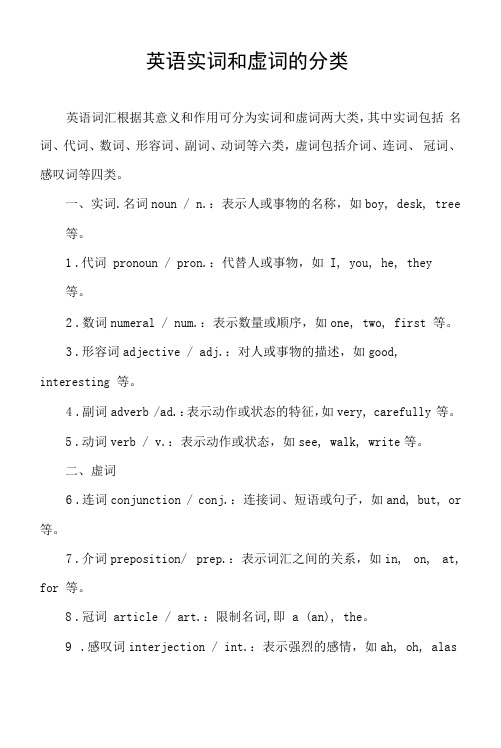
英语实词和虚词的分类英语词汇根据其意义和作用可分为实词和虚词两大类,其中实词包括名词、代词、数词、形容词、副词、动词等六类,虚词包括介词、连词、冠词、感叹词等四类。
一、实词.名词noun / n.:表示人或事物的名称,如boy, desk, tree等。
1.代词 pronoun / pron.:代替人或事物,如 I, you, he, they等。
2.数词numeral / num.:表示数量或顺序,如one, two, first 等。
3.形容词adjective / adj.:对人或事物的描述,如good, interesting 等。
4.副词adverb /ad.:表示动作或状态的特征,如very, carefully 等。
5.动词verb / v.:表示动作或状态,如see, walk, write等。
二、虚词6.连词conjunction / conj.:连接词、短语或句子,如and, but, or 等。
7.介词preposition/ prep.:表示词汇之间的关系,如in, on, at, for 等。
8.冠词 article / art.:限制名词,即 a (an), the。
9.感叹词interjection / int.:表示强烈的感情,如ah, oh, alas等。
英语里有不少词可以属于几个不同词类,如sleep既可属于动词,也可属于名词;early既可属于形容词,也可属于副词;after既可属于介词,也可属于连词;since则既可以是介词和连词,也可以是副词。
如:If you want to catch the early bus, you must get up early. 你若想赶上早班车,你就得早起。
(句中的第一个early为形容词,第二个early 为副词)。
【英语的词性分类】必须牢记的英语十类词性分类及用法,史上最全讲解!
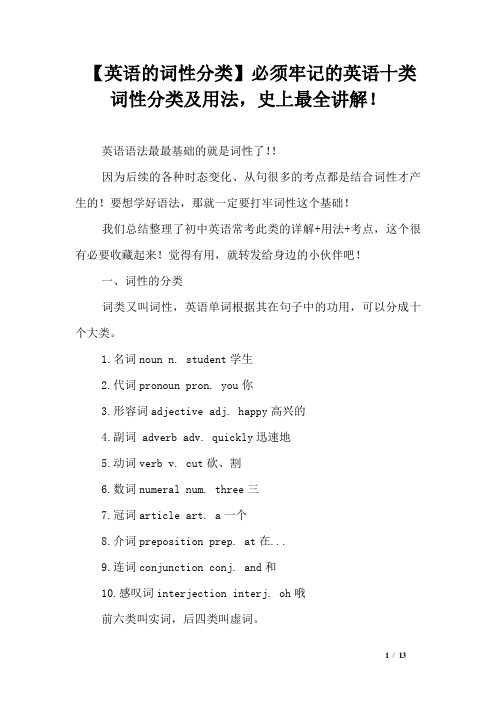
【英语的词性分类】必须牢记的英语十类词性分类及用法,史上最全讲解!英语语法最最基础的就是词性了!!因为后续的各种时态变化、从句很多的考点都是结合词性才产生的!要想学好语法,那就一定要打牢词性这个基础!我们总结整理了初中英语常考此类的详解+用法+考点,这个很有必要收藏起来!觉得有用,就转发给身边的小伙伴吧!一、词性的分类词类又叫词性,英语单词根据其在句子中的功用,可以分成十个大类。
1.名词noun n. student学生2.代词pronoun pron. you你3.形容词adjective adj. happy高兴的4.副词 adverb adv. quickly迅速地5.动词verb v. cut砍、割6.数词numeral num. three三7.冠词article art. a一个8.介词preposition prep. at在...9.连词conjunction conj. and和10.感叹词interjection interj. oh哦前六类叫实词,后四类叫虚词。
二、名词名词复数的规则变化名词的格在英语中有些名词可以加“‘s”来表示所有关系,带这种词尾的名词形式称为该名词的所有格,如:a teacher’s book。
名词所有格的规则如下:1)单数名词词尾加“'s”,复数名词词尾没有s,也要加“'s”,如the boy‘s bag男孩的书包,men’s room男厕所。
2)若名词已有复数词尾-s ,只加“'”,如:the workers’struggle工人的斗争。
三、代词大多数代词具有名词和形容词的功能。
英语中的代词,按其意义、特征及在句中的作用分为:人称代词、物主代词、指示代词、反身代词、相互代词、疑问代词、关系代词、连接代词和不定代词九种人称代词的用法:I saw her with them, at least, I thought it was her.我看到她和他们在一起,至少我认为是她。
形容词和副词的比较级与最高级用法
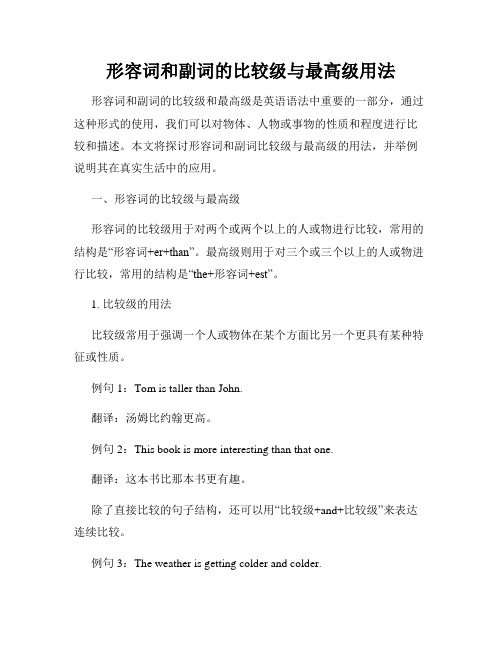
形容词和副词的比较级与最高级用法形容词和副词的比较级和最高级是英语语法中重要的一部分,通过这种形式的使用,我们可以对物体、人物或事物的性质和程度进行比较和描述。
本文将探讨形容词和副词比较级与最高级的用法,并举例说明其在真实生活中的应用。
一、形容词的比较级与最高级形容词的比较级用于对两个或两个以上的人或物进行比较,常用的结构是“形容词+er+than”。
最高级则用于对三个或三个以上的人或物进行比较,常用的结构是“the+形容词+est”。
1. 比较级的用法比较级常用于强调一个人或物体在某个方面比另一个更具有某种特征或性质。
例句1:Tom is taller than John.翻译:汤姆比约翰更高。
例句2:This book is more interesting than that one.翻译:这本书比那本书更有趣。
除了直接比较的句子结构,还可以用“比较级+and+比较级”来表达连续比较。
例句3:The weather is getting colder and colder.翻译:天气越来越冷。
2. 最高级的用法最高级用于强调一个人或物在某个方面超过其他所有人或物,是比较级的最高级形式。
例句4:He is the tallest boy in the class.翻译:他是班里最高的男孩。
例句5:This is the most delicious cake I have ever tasted.翻译:这是我尝过的最美味的蛋糕。
二、副词的比较级与最高级与形容词类似,副词的比较级和最高级也是用于对两个或两个以上的动作或状态进行比较和描述的。
常用的结构是“副词+er+than”和“the+副词+est”。
1. 比较级的用法副词的比较级用于对两个或两个以上的动作或状态进行程度上的比较。
例句6:He speaks English more fluently than his sister.翻译:他说英语比他妹妹更流利。
形容词和副词笔记整理

形容词和副词是英语中两种重要的词性,它们在句子中起到修饰、限定或补充说明的作用。
下面是形容词和副词的笔记整理:1. 形容词(Adjective)形容词用来描述名词或代词的特征或性质,通常放在名词前面作定语。
例如:a beautiful girl(一个漂亮的女孩)、the red apple(那个红色的苹果)。
2. 形容词的比较级和最高级形容词有比较级和最高级形式,用于表示两个或多个事物之间的比较。
比较级通常用“-er”结尾,最高级则用“-est”结尾。
例如:taller(更高的)、tallest(最高的);faster(更快的)、fastest(最快的)。
3. 形容词的用法形容词可以修饰单个名词,也可以修饰复数名词或不可数名词。
例如:a big house(一个大房子)、two small cats(两只小猫)、some delicious food(一些美味的食物)。
4. 副词(Adverb)副词用来修饰动词、形容词、其他副词或整个句子,通常放在被修饰词的后面。
例如:She sings beautifully.(她唱得很美。
)5. 副词的种类副词可以分为时间副词、地点副词、方式副词、程度副词等。
例如:now(现在)、here(这里)、quickly(快速地)、very(非常)。
6. 副词的位置副词可以放在句子的不同位置,以表示不同的意义。
一般来说,时间副词放在句首或句尾,地点副词放在句首或句尾,方式副词放在动词后面,程度副词放在所修饰的词前面。
例如:Yesterday, I went to the park.(昨天,我去了公园。
);I went to the park yesterday.(我昨天去了公园。
);I walked quickly to the store.(我快步走到了商店。
);I very much enjoyed the movie.(我非常喜欢这部电影。
)。
英语十大词性及用法
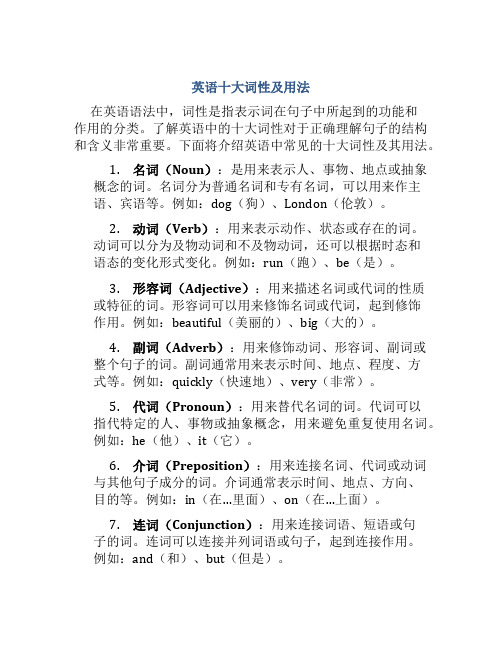
英语十大词性及用法在英语语法中,词性是指表示词在句子中所起到的功能和作用的分类。
了解英语中的十大词性对于正确理解句子的结构和含义非常重要。
下面将介绍英语中常见的十大词性及其用法。
1.名词(Noun):是用来表示人、事物、地点或抽象概念的词。
名词分为普通名词和专有名词,可以用来作主语、宾语等。
例如:dog(狗)、London(伦敦)。
2.动词(Verb):用来表示动作、状态或存在的词。
动词可以分为及物动词和不及物动词,还可以根据时态和语态的变化形式变化。
例如:run(跑)、be(是)。
3.形容词(Adjective):用来描述名词或代词的性质或特征的词。
形容词可以用来修饰名词或代词,起到修饰作用。
例如:beautiful(美丽的)、big(大的)。
4.副词(Adverb):用来修饰动词、形容词、副词或整个句子的词。
副词通常用来表示时间、地点、程度、方式等。
例如:quickly(快速地)、very(非常)。
5.代词(Pronoun):用来替代名词的词。
代词可以指代特定的人、事物或抽象概念,用来避免重复使用名词。
例如:he(他)、it(它)。
6.介词(Preposition):用来连接名词、代词或动词与其他句子成分的词。
介词通常表示时间、地点、方向、目的等。
例如:in(在…里面)、on(在…上面)。
7.连词(Conjunction):用来连接词语、短语或句子的词。
连词可以连接并列词语或句子,起到连接作用。
例如:and(和)、but(但是)。
8.冠词(Article):用来限定名词的词。
有定冠词“the”和不定冠词“a”、“an”。
冠词用来表示名词的特指和泛指。
例如:the book(那本书)、a cat(一只猫)。
9.数词(Numeral):用来表示数目、顺序或序数的词。
数词可以分为基数词和序数词,用来表示数量和顺序关系。
例如:three(三)、first(第一)。
10.感叹词(Interjection):用来表示情感、感叹或呼唤的词。
英语四级语法考点总结

英语四级语法考点总结英语四级考试是中国大学英语四六级考试的简称,是对大学本科生英语能力的一种评估方式。
在四级考试中,语法部分一直被认为是考生们需要重点关注和备考的考点之一。
本篇文章将对英语四级语法考点进行总结,以帮助考生们更好地应对考试。
一、名词(Noun)名词是英语句子中最基本的词性之一,可以用来表示人、事物、地点、概念等具体或抽象的事物。
在考试中,常见的名词考点有以下几个方面:1.名词的单复数形式(Noun Number)名词的单数和复数形式在表达时需要根据语法规则进行变化。
常见的规则包括在名词后面加-s或-es,或者改变词尾字母等。
例如,book (书)的复数形式为books(书籍),child(孩子)的复数形式为children(孩子们)等。
2.可数名词与不可数名词(Countable and Uncountable Nouns)可数名词表示可以被计数的事物,可以使用不同的数量词进行修饰,如a/an,two,three等。
而不可数名词表示无法被具体计数的事物,只能使用一些表示数量的词语进行修饰,如some,much,a lot of等。
例如,water(水)是不可数名词,而book(书)是可数名词。
3.名词所有格(Possessive Nouns)名词所有格用来表示某物属于某人或某物,通常在名词后面加上-apostrophe和-s。
例如,John's book(约翰的书),the cat's tail(猫的尾巴)等。
二、代词(Pronoun)代词是用来代替名词或名词短语的词语,可以分为人称代词、物主代词、反身代词、指示代词等。
常见的代词考点有以下几个方面:1.人称代词(Personal Pronouns)人称代词用来表示说话者、听话者或其他人的身份或位置。
在考试中,常见的人称代词有I,you,he,she,it,we,they等。
2.物主代词(Possessive Pronouns)物主代词用来表示某物属于某人或某物,可以替代名词所有格的用法。
independence的形容词和副词
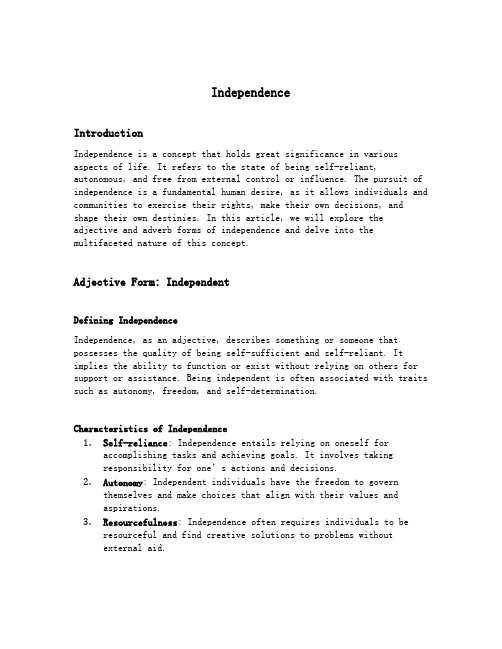
IndependenceIntroductionIndependence is a concept that holds great significance in various aspects of life. It refers to the state of being self-reliant, autonomous, and free from external control or influence. The pursuit of independence is a fundamental human desire, as it allows individuals and communities to exercise their rights, make their own decisions, and shape their own destinies. In this article, we will explore theadjective and adverb forms of independence and delve into the multifaceted nature of this concept.Adjective Form: IndependentDefining IndependenceIndependence, as an adjective, describes something or someone that possesses the quality of being self-sufficient and self-reliant. It implies the ability to function or exist without relying on others for support or assistance. Being independent is often associated with traits such as autonomy, freedom, and self-determination.Characteristics of Independence1.Self-reliance: Independence entails relying on oneself foraccomplishing tasks and achieving goals. It involves takingresponsibility for one’s actions and decisions.2.Autonomy: Independent individuals have the freedom to governthemselves and make choices that align with their values andaspirations.3.Resourcefulness: Independence often requires individuals to beresourceful and find creative solutions to problems withoutexternal aid.4.Individuality: Independence allows individuals to express theirunique qualities, thoughts, and beliefs without conforming tosocietal pressures or expectations.5.Resilience: Independent individuals possess the strength andperseverance to overcome obstacles and challenges, adapting tochanging circumstances.Examples of Independence in Different Contexts1.Political Independence: Nations strive for political independenceto govern themselves without interference from external powers.Examples include the independence movements of many formercolonies.2.Financial Independence: Achieving financial independence meansbeing self-sufficient and not relying on others for financialsupport. This can be attained through saving, investing, andgenerating passive income.3.Personal Independence: Personal independence refers to theability to make decisions and live life according to one’s ownvalues and aspirations, free from undue influence.4.Academic Independence: In academia, independence is valued as itallows researchers and scholars to pursue their own ideas andcontribute to the advancement of knowledge.Adverb Form: IndependentlyDefining IndependenceIndependently, as an adverb, describes the manner in which an action or task is performed without external assistance or control. It emphasizes the self-reliance and autonomy with which an individual or entity operates.Advantages of Acting Independently1.Flexibility: Acting independently allows individuals to adaptquickly to changing circumstances and make decisions without the need for consensus or approval from others.2.Empowerment: Independence empowers individuals to take ownershipof their actions and achievements, fostering a sense of self-confidence and personal growth.3.Innovation: Working independently often encourages creativity andinnovation, as individuals are free to explore new ideas andapproaches without constraints.4.Efficiency: Acting independently can lead to increased efficiency,as individuals can focus solely on their tasks without the needfor coordination or collaboration.Examples of Acting Independently1.Entrepreneurship: Entrepreneurs often start their own businessesto pursue their vision independently, taking risks and makingdecisions without relying on others.2.Artistic Pursuits: Independent artists, such as musicians,writers, and filmmakers, often work outside the mainstreamindustry, allowing them to express their creativity freely.3.Research and Exploration: Scientists and explorers often workindependently to pursue their interests and make groundbreakingdiscoveries that may not align with established norms orexpectations.4.Self-learning: Many individuals engage in independent learning,acquiring knowledge and skills through self-directed study oronline courses.ConclusionIndependence, both as an adjective and an adverb, plays a crucial rolein various aspects of life. Whether it is the pursuit of personal autonomy, political self-governance, or the ability to act without external influence, independence empowers individuals and communities to shape their own destinies. By embracing independence, we can fosterself-reliance, innovation, and personal growth, ultimately leading to a more empowered and resilient society.。
Adjective and adverb

later—latest(指时间) (二)late
时间
latter—last(指顺序)
They reached the place later than we. Twenty years later he returned to his home village.
顺序
Who spoke last? The latter speaker was not so good as the former.
构成法
+er(比较级) +est(最高级)[ist] +r(比较级) +st(最高级) small hard great
举例
smaller smallest harder hardest greater greatest
large larger largest wide wider widest brave braver bravest bigger hotter thinner biggest hottest thinnest
Adjective and Adverb 形容词和副词
刘长春 教授
The degrees of the adjective and the adverb 形容词和副词的级
Ⅰ、意义:英语形容词和副词,在表示“比较——”和 “最——”的概念时,要用特别的形式,称为比较级(the degrees of comparison )和最高级(the superlative degree), 与之相对,原来的形式称为原级(the positive degree)。因 此,比较等级包括比较级和最高级两种。 平时所见的形容词通常称为原级,即形容词原形,它是构 成比较级和最高级的基础形式。原级只是一般地称谓某事 物的特征,本身并无比较的涵义。 比较级和最高级跟原级不同,本身带有比较涵义,表示通 过比较得出性质程度的差异。 small adj. 小的 young 年轻的 smaller 较小的 younger 比较年轻的 smallest 最小的 youngest 最年轻的
(完整版)英语十大词性及其详细讲解

词类又叫词性,英语单词根据其在句子中的功用,可以分成十个大类。
1.名词noun n. student 学生2.代词pronoun pron. you 你3.形容词adjective adj. happy 高兴的4.副词adverb adv. quickly 迅速地5.动词verb v. cut 砍、割6.数词numeral num. three 三7.冠词article art. a 一个8.介词preposition prep. at 在...9.连词conjunction conj. and 和10.感叹词interjection interj. oh 哦前六类叫实词,后四类叫虚词。
名词复数的规则变化名词的格在英语中有些名词可以加“‘s”来表示所有关系,带这种词尾的名词形式称为该名词的所有格,如:a teacher’s book。
名词所有格的规则如下:1)单数名词词尾加“'s”,复数名词词尾没有s,也要加“'s”,如the boy‘s bag 男孩的书包,men’s room 男厕所。
2)若名词已有复数词尾-s ,只加“'”,如:the workers’struggle工人的斗争。
大多数代词具有名词和形容词的功能。
英语中的代词,按其意义、特征及在句中的作用分为:人称代词、物主代词、指示代词、反身代词、相互代词、疑问代词、关系代词、连接代词和不定代词九种人称代词的用法:I saw her with them,at least,I thought it was her.我看到她和他们在一起,至少我认为是她。
(her做宾语,them做介词宾语,her作主补)a. -- Who broke the vase?--谁打碎了花瓶?b. -- Me.--我。
并列人称代词的排列顺序1) 单数人称代词并列作主语时,其顺序为:第二人称you第三人称he/she;it第一人称I如:You, he and I should return on time.2) 复数人称代词作主语时,其顺序为:第一人称we第二人称you第三人称they反身代词指示代词指示代词分单数(this / that)和复数(these / those)两种形式,既可作限定词又可做代词,疑问代词指人:who,whom,whose指物:what既可指人又可指物:which冠词是位于名词或名词词组之前或之后,在句子里主要是对名词起限定作用的词。
英语十大词性口诀和用法
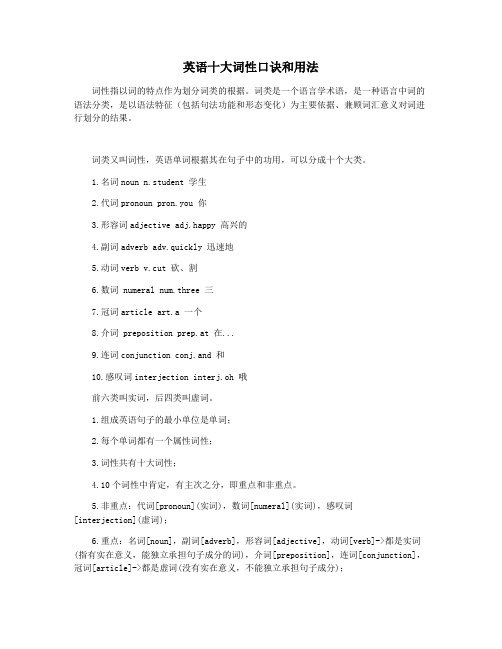
英语十大词性口诀和用法词性指以词的特点作为划分词类的根据。
词类是一个语言学术语,是一种语言中词的语法分类,是以语法特征(包括句法功能和形态变化)为主要依据、兼顾词汇意义对词进行划分的结果。
词类又叫词性,英语单词根据其在句子中的功用,可以分成十个大类。
1.名词noun n.student 学生2.代词pronoun pron.you 你3.形容词adjective adj.happy 高兴的4.副词adverb adv.quickly 迅速地5.动词verb v.cut 砍、割6.数词 numeral num.three 三7.冠词article art.a 一个8.介词 preposition prep.at 在...9.连词conjunction conj.and 和10.感叹词interjection interj.oh 哦前六类叫实词,后四类叫虚词。
1.组成英语句子的最小单位是单词;2.每个单词都有一个属性词性;3.词性共有十大词性;4.10个词性中肯定,有主次之分,即重点和非重点。
5.非重点:代词[pronoun](实词),数词[numeral](实词),感叹词[interjection](虚词);6.重点:名词[noun],副词[adverb],形容词[adjective],动词[verb]->都是实词(指有实在意义,能独立承担句子成分的词),介词[preposition],连词[conjunction],冠词[article]->都是虚词(没有实在意义,不能独立承担句子成分);(提示:实词有词形的变化,特别是变化多端的动词)7.代词(简单说)[7-1]指代替名词的词(给名词前加个pro,就是代词了,不信你看pronoun = pro + noun)[7-2]代词举例:he(他),her(她的),themselves(他们自己),that(那些) who(谁),everyone(每个人);8.数词(简单说)直接上例子:one(1),second(第二),two-fourth 2/4;9.感叹词(简单说)表示喜,怒,哀,乐等感情。
英语单词词性大全

英语单词词性大全英语单词词性n. 名词 v. 动词 pron. 代词adj. 形容词 adv. 副词 num.数词art. 冠词 prep. 介词 conj. 连词interj. 感叹词英语词性缩写prep = 介系词;前置词,preposition的缩写pron = 代名词,pronoun的缩写n = 名词,noun的缩写v = 动词,兼指及物动词和不及物动词,verb的缩写conj = 连接词,conjunction的缩写s = 主词 sc = 主词补语 o = 受词oc = 受词补语vi = 不及物动词,intransitive verb的缩写vt = 及物动词,transitive verb的缩写aux.v = 助动词,auxiliary的缩写a = 形容词,adjective的缩写ad = 副词,adverb的缩写art = 冠词,article的缩写num = 数词,numeral的缩写int = 感叹词,interjection的缩写u = 不可数名词,uncountable noun的缩写c = 可数名词,countable noun的缩写pl = 复数,plural的缩写语气词 int. 缩写词 abbr.abbr abbreviation(略)略语adj, adjjadjective(s)(形)形容词adv, advvadverb(s)(副)副词adv partadverbial particle(副接)副词接语aux auxiliary(助)助动词cn countable noun(可数)可数名词conj conjunction(连)连接def art definite article(定冠)定冠词egfor example(例如)例如esp especially(尤指)尤指etc and the others(等)等等 ie which is to say(意即)意即indef art indefinite article(不定冠词)不定冠词inf infinitive(不定词)不定词int interjection(感)感叹词n noun(s) (名)名词neg negative(ly)(否定)否定的(地)part adj participial adjective(分形)分词形容词pers person(人称)人称pers pron personal pronoun(人称代)人称代名词pl plural(复)复数(的)pp past participle (过去分词)过去分词pref prefix(字首)字首prep preposition(al) (介词)介词,介系词,介词的pron pronoun (代)代名词pt past tense(过去)过去式sb somebody(某人)某人sing singular(单)单数(的)sth something(某事物)某物或某事suff suffix(字尾)字尾un uncountable noun(不可数)不可数名词US America(n)(美)美国(的)vverb(s) (动)动词[VP]Verb Pattern(动型)动词类型v iverb intransitive(不及物动词)不及物动词vt verb transitive (及物动词)及物动词除这十大类词之外,英语还另有判断词yes和no。
形容词和副词

作不定代词someone, something, somebody; anyone, anything, anybody, everyone, everything everybody; nothing, no one nobody的定语时,定于后置
10.This is a__________clock .
A.nice Swiss little
B.nice little Swiss
C.little nice Swiss
D.Swiss nice little
11.She spent___________time studying French.
A.much so B. so much C.such much D.so many
12.----Which do you find_____to learn,Japanese or
English?
----English.
A.easy B.easier C.more easily D.it much easier
13.Of the two oceans,the Pacific is_______.
那汤尝起来很不错
2)有些形容词是以-ly结尾的,我们容易把它们误 认为是副词
如: lovely(可爱的),friendly(友好的) ,orderly(有 序的),slightly(悦耳的),motherly(母亲般的), sisterly(姐妹般的),brotherly(兄弟般的)。
She looks lovely.她看上去很漂亮 3. 宾语的补足语 形容词作宾语补足语即与宾语一起构成复合
大学四级必背单词词汇表形容词与副词
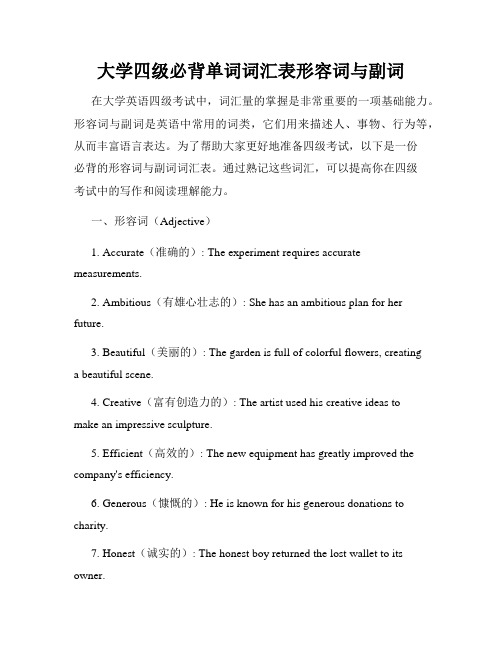
大学四级必背单词词汇表形容词与副词在大学英语四级考试中,词汇量的掌握是非常重要的一项基础能力。
形容词与副词是英语中常用的词类,它们用来描述人、事物、行为等,从而丰富语言表达。
为了帮助大家更好地准备四级考试,以下是一份必背的形容词与副词词汇表。
通过熟记这些词汇,可以提高你在四级考试中的写作和阅读理解能力。
一、形容词(Adjective)1. Accurate(准确的): The experiment requires accurate measurements.2. Ambitious(有雄心壮志的): She has an ambitious plan for her future.3. Beautiful(美丽的): The garden is full of colorful flowers, creatinga beautiful scene.4. Creative(富有创造力的): The artist used his creative ideas tomake an impressive sculpture.5. Efficient(高效的): The new equipment has greatly improved the company's efficiency.6. Generous(慷慨的): He is known for his generous donations to charity.7. Honest(诚实的): The honest boy returned the lost wallet to its owner.8. Interesting(有趣的): The movie was so interesting that I couldn't take my eyes off the screen.9. Logical(合乎逻辑的): Your argument is not logical, and it's hard to convince others.10. Responsible(负责任的): As a team leader, she is responsible for coordinating everyone's work.二、副词(Adverb)1. Carefully(小心地): She carefully examined the evidence before making a decision.2. Easily(容易地): He can easily solve difficult math problems without much effort.3. Fortunately(幸运地): Fortunately, nobody was injured in the car accident.4. Hard(努力地): She worked hard to achieve her dream of becominga professional dancer.5. Loudly(大声地): The teacher spoke loudly to get everyone's attention in the classroom.6. Quickly(快速地): She ran quickly to catch the bus before it drove away.7. Seriously(认真地): He took the job seriously and always gave his best effort.8. Well(完全地): She knows the subject well and can answer any questions about it.9. Wisely(明智地): He wisely invested his money and earned a great profit.10. Wrongly(错误地): She was wrongly accused of stealing the money, but later it was discovered that someone else had done it.这些形容词与副词的词汇可以帮助你在四级考试中更加准确地表达自己的意思,提升你的写作和阅读理解能力。
英语八大词性
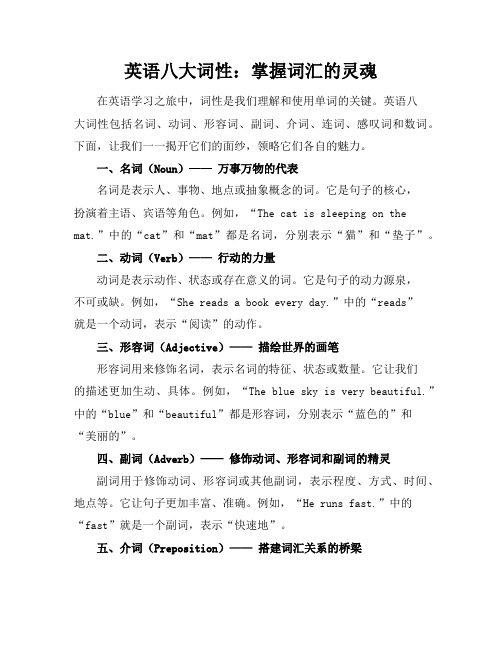
英语八大词性:掌握词汇的灵魂在英语学习之旅中,词性是我们理解和使用单词的关键。
英语八大词性包括名词、动词、形容词、副词、介词、连词、感叹词和数词。
下面,让我们一一揭开它们的面纱,领略它们各自的魅力。
一、名词(Noun)——万事万物的代表名词是表示人、事物、地点或抽象概念的词。
它是句子的核心,扮演着主语、宾语等角色。
例如,“The cat is sleeping on the mat.”中的“cat”和“mat”都是名词,分别表示“猫”和“垫子”。
二、动词(Verb)——行动的力量动词是表示动作、状态或存在意义的词。
它是句子的动力源泉,不可或缺。
例如,“She reads a book every day.”中的“reads”就是一个动词,表示“阅读”的动作。
三、形容词(Adjective)——描绘世界的画笔形容词用来修饰名词,表示名词的特征、状态或数量。
它让我们的描述更加生动、具体。
例如,“The blue sky is very beautiful.”中的“blue”和“beautiful”都是形容词,分别表示“蓝色的”和“美丽的”。
四、副词(Adverb)——修饰动词、形容词和副词的精灵副词用于修饰动词、形容词或其他副词,表示程度、方式、时间、地点等。
它让句子更加丰富、准确。
例如,“He runs fast.”中的“fast”就是一个副词,表示“快速地”。
五、介词(Preposition)——搭建词汇关系的桥梁介词是连接名词或代词与其他词的关系词,它告诉我们位置、方向、时间、原因等。
介词如同小巧的桥梁,让词汇之间的关系清晰可见。
例如,“She is sitting at the desk.”中的“at”就是介词,指明“她”坐在“桌子”的特定位置。
六、连词(Conjunction)——句子结构的粘合剂连词是用来连接单词、短语或句子的词,它们如同语言的胶水,将不同的部分紧密连接。
常见的连词有“and”、“but”、“or”等。
英语当中形容词和副词的用法
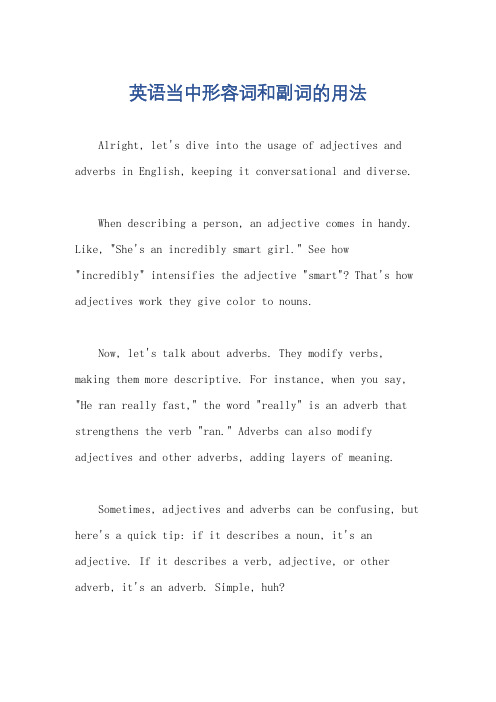
英语当中形容词和副词的用法Alright, let's dive into the usage of adjectives and adverbs in English, keeping it conversational and diverse.When describing a person, an adjective comes in handy. Like, "She's an incredibly smart girl." See how "incredibly" intensifies the adjective "smart"? That's how adjectives work they give color to nouns.Now, let's talk about adverbs. They modify verbs, making them more descriptive. For instance, when you say, "He ran really fast," the word "really" is an adverb that strengthens the verb "ran." Adverbs can also modify adjectives and other adverbs, adding layers of meaning.Sometimes, adjectives and adverbs can be confusing, but here's a quick tip: if it describes a noun, it's an adjective. If it describes a verb, adjective, or other adverb, it's an adverb. Simple, huh?Adjectives can also be used in comparisons. Like, "This cake is more delicious than that one." The word "more" here is an adverb modifying the adjective "delicious," but it's also used for comparison.And don't forget about adjective phrases! They're groups of words that function as adjectives. For example, "the book with the red cover" "with the red cover" is an adjective phrase describing the noun "book."Adverbs, on the other hand, can be used to modifyentire sentences or clauses. In the.。
英语形容词和副词
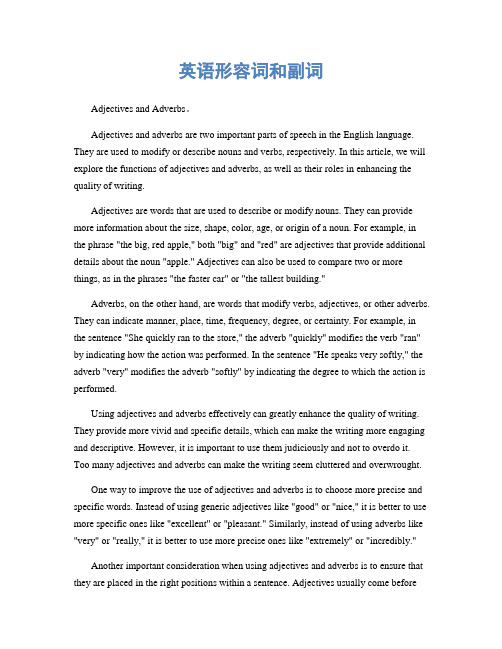
英语形容词和副词Adjectives and Adverbs。
Adjectives and adverbs are two important parts of speech in the English language. They are used to modify or describe nouns and verbs, respectively. In this article, we will explore the functions of adjectives and adverbs, as well as their roles in enhancing the quality of writing.Adjectives are words that are used to describe or modify nouns. They can provide more information about the size, shape, color, age, or origin of a noun. For example, in the phrase "the big, red apple," both "big" and "red" are adjectives that provide additional details about the noun "apple." Adjectives can also be used to compare two or more things, as in the phrases "the faster car" or "the tallest building."Adverbs, on the other hand, are words that modify verbs, adjectives, or other adverbs. They can indicate manner, place, time, frequency, degree, or certainty. For example, in the sentence "She quickly ran to the store," the adverb "quickly" modifies the verb "ran" by indicating how the action was performed. In the sentence "He speaks very softly," the adverb "very" modifies the adverb "softly" by indicating the degree to which the action is performed.Using adjectives and adverbs effectively can greatly enhance the quality of writing. They provide more vivid and specific details, which can make the writing more engaging and descriptive. However, it is important to use them judiciously and not to overdo it. Too many adjectives and adverbs can make the writing seem cluttered and overwrought.One way to improve the use of adjectives and adverbs is to choose more precise and specific words. Instead of using generic adjectives like "good" or "nice," it is better to use more specific ones like "excellent" or "pleasant." Similarly, instead of using adverbs like "very" or "really," it is better to use more precise ones like "extremely" or "incredibly."Another important consideration when using adjectives and adverbs is to ensure that they are placed in the right positions within a sentence. Adjectives usually come beforethe noun they modify, while adverbs can appear before or after the verb they modify. It is important to pay attention to the placement of these words to avoid confusion or ambiguity.In addition, it is important to be aware of the comparative and superlative forms of adjectives and adverbs when using them to make comparisons. The comparative form is used to compare two things, while the superlative form is used to compare three or more things. For example, "faster" is the comparative form of the adjective "fast," and "fastest" is the superlative form.In conclusion, adjectives and adverbs are important tools for enhancing the quality of writing. They provide more specific and vivid details, making the writing more engaging and descriptive. By using them judiciously and choosing precise words, writers can create more powerful and effective prose. It is important to pay attention to the placement of adjectives and adverbs within a sentence, as well as to use the comparative and superlative forms correctly. With practice and attention to detail, writers can master the use of adjectives and adverbs to improve their writing.。
英语形容词副词练习题
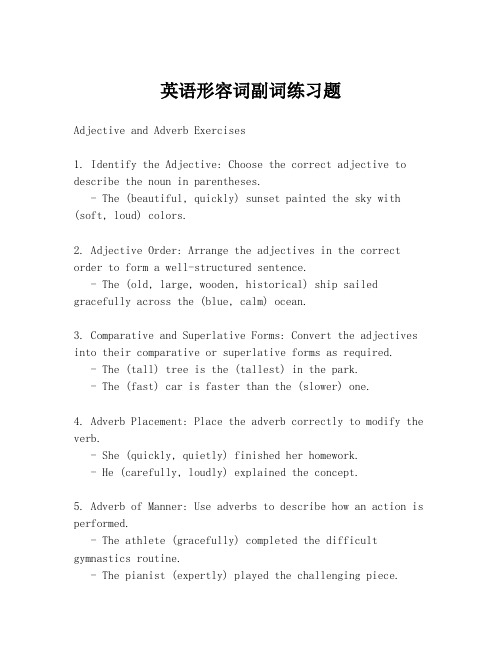
英语形容词副词练习题Adjective and Adverb Exercises1. Identify the Adjective: Choose the correct adjective to describe the noun in parentheses.- The (beautiful, quickly) sunset painted the sky with (soft, loud) colors.2. Adjective Order: Arrange the adjectives in the correct order to form a well-structured sentence.- The (old, large, wooden, historical) ship sailed gracefully across the (blue, calm) ocean.3. Comparative and Superlative Forms: Convert the adjectives into their comparative or superlative forms as required.- The (tall) tree is the (tallest) in the park.- The (fast) car is faster than the (slower) one.4. Adverb Placement: Place the adverb correctly to modify the verb.- She (quickly, quietly) finished her homework.- He (carefully, loudly) explained the concept.5. Adverb of Manner: Use adverbs to describe how an action is performed.- The athlete (gracefully) completed the difficult gymnastics routine.- The pianist (expertly) played the challenging piece.6. Adverb of Frequency: Choose the correct adverb to indicate how often an action occurs.- She (rarely, frequently) visits her grandparents.- They (occasionally, always) go on vacation in the summer.7. Adverb of Degree: Use adverbs to express the extent or degree of something.- The story was (extremely, slightly) interesting.- He was (completely, partially) unaware of the situation.8. Adverb of Time: Choose the adverb that correctly indicates when something happens.- The concert (yesterday, tomorrow) was a great success.- She will (soon, late) arrive at the meeting.9. Adjective or Adverb?: Determine whether the word in parentheses should be an adjective or an adverb.- The (quick, quickly) runner won the race.- The (happy, happily) child played in the park.10. Negative Adverbs: Use the correct negative form of the adverb.- She did not (quickly, quickly) finish her homework.- He (rarely, quickly) makes mistakes.11. Adverbial Clauses: Use adverbs to connect clauses andshow the relationship between them.- Although he was tired, he (nevertheless, quickly) completed the task.- Because she was late, she (hastily, slowly) ate herbreakfast.12. Conjunctions with Adverbs: Use conjunctions to link sentences and adverbs to show the relationship.- He (not only, also) finished his work, but he did it (quickly, carefully).Remember to always consider the context when choosing between an adjective or an adverb, and ensure that the form you choose correctly conveys the intended meaning.。
形容词和副词

3. often,stupid,handsome, polite 等 词有两种比较等级形式
如:often→oftener→oftenest 或 often→more often→(the) most
often
4. good 等词的比较级和最高级形式是不规 则的。
fore→foremost 最前的 top→topmost 最高的 back级形式,
常见 的还有:dead, complete, empty,round,right, woolen 等。
形容词和副词的比较句型
1. 原级比较:甲方像(或 “不如”)乙方 肯定:as+形容词原级/副词原级 + as 否定:not as/so +形容词原级/副词原级
如:Our room is twice as big as yours. 我们的房间是你们的两倍大。
3. 比较级比较:甲超过(或“不及”)乙 比较级形容词或比较级副词+ than 从句 如:He runs faster than you (do). 他跑得比你快。 注意:than 为连词,引出比较状语从句
inner 在内的→in(ner)most 最内的
outer 外面的→out(er)most 最外的
eastern 东部的→ easternmost 最东部 的
western 西部的→westernmost 最西 部的
southern 南部的→southernmost 最 南部的
northern北部的→northernmost 最 北部的
词类(parts of speech)
形容词(adjective,缩写为adj.) 和 副词(adverb,缩写为adv.)
名词形容词动词副词

词类英语名称作用例词名词Noun(缩写为n。
)表示人或事物的名称party政党China中国代词Pronoun(pron。
) 用来代替名词、形容词或数词等He他that那数词Numeral(num。
)表示数量或顺序one一first第一形容词Adjective(adj.)用来修饰名词,表示人或事物的特性、性质safe安全的great伟大的副词Adverb (adv.) 用来修饰动词、形容词或其他副词,表示动作或形状的特性hard艰苦地here 这里冠词Article (art。
)用在名词前,帮助说明名词所指的人或事物an,a,the动词Verb (v。
)表示人或事物的动作或状态eat吃have有介词Preposition(prep.)用在名词、代词等前面,说明句子中词与词之间的关系under在。
.。
下in在。
.。
里连词Conjunction(conj.) 用来连接词、短语或句子and和but但是感叹词Interjection(interj.) 表示说话时的感情或口气一、名词按意义分类1.专有名词—表示具体的人,事物,地点,团体或机构的专有名称(第一个字母要大写) 例:China 中国Asia 亚洲Beijing 北京the People’s Republic of China 中华人民共和国专有名词如果是含有普通名词的短语,则必须使用定冠词the.如:the Great Wall(长城) 姓氏名如果采用复数形式,则表示该姓氏一家人(复数含义),如:the Greens( 格林一家人).2.普通名词—表示某些人,某类事物,某种物质或抽象概念的名称。
(例如:teacher 老师tea 茶reform 改革)普通名词又可进一步分为四类:1。
个体名词(.(car 汽车room 房间fan 风扇photo 照片) 2。
集体名词(Collective Nouns):表示一群人或一army 军队government政府group 集团) 3. 物质名词(Material Nouns):steel 钢air 空气water 水milk牛奶) 4。
形容词副词的比较级和最高级
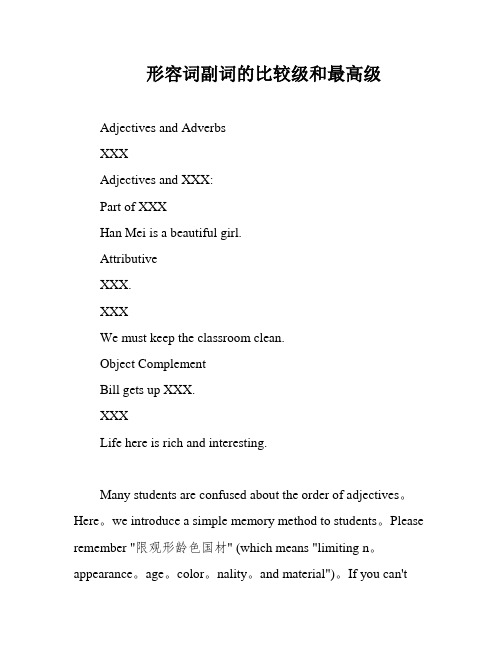
形容词副词的比较级和最高级Adjectives and AdverbsXXXAdjectives and XXX:Part of XXXHan Mei is a beautiful girl.AttributiveXXX.XXXWe must keep the classroom clean.Object ComplementBill gets up XXX.XXXLife here is rich and interesting.Many students are confused about the order of adjectives。
Here。
we introduce a simple memory method to students。
Please remember "限观形龄色国材" (which means "limiting n。
appearance。
age。
color。
nality。
and material")。
If you can'tremember these characters。
you can remember "县官行令XXX" (which is a similar phrase with the same meaning).XXXRepresentative of limiting words。
including articles。
demonstrative pronouns。
possessive adjectives。
noun possessives。
number words。
etc。
the。
this。
that。
my。
Tom's。
two XXX。
beautiful。
interestingXXX adjectives that express size。
length。
height。
shape。
- 1、下载文档前请自行甄别文档内容的完整性,平台不提供额外的编辑、内容补充、找答案等附加服务。
- 2、"仅部分预览"的文档,不可在线预览部分如存在完整性等问题,可反馈申请退款(可完整预览的文档不适用该条件!)。
- 3、如文档侵犯您的权益,请联系客服反馈,我们会尽快为您处理(人工客服工作时间:9:00-18:30)。
大多数的形容词、副词都有三个等级:原级:比较级:比较...,更...一些最高级:最...(A)1.构成:(规则情况)2.不规则变化,须熟记:good/well-better-best many/much-more-most far-farther-farthest bad/badly/ill-worse-worst little-less-least(B)常见的使用情况1.as … as … 和...一样(中间用原级)2.not as(so) … as 和...不一样(中间用原级)3… than …. ..比...(用比较级)4.有范围修饰的用最高级如:in, of, among或用从句修饰的eg. A. Winter is the coldest season of the year.B. This is the best film that I have ever seen .5.比较级+and+比较级意为―越来越…...‖eg: wetter and wetter more and more beautiful6. The+比较级,the+比较级越…...就越…...eg:The more, the better. 越多越好(C)注意点:1.形容词最高级前一定要用the,副词最高级前可省略。
2.可用much, a little, even, still等修饰比较级。
3.在比较级中为了避免重复,在than后常用one,that,those等词来替代前面提到过的名词。
eg:The weather here is warmer than that of Shanghai.(D)掌握三种同义句转换:1.He is taller than any other student in his class.=He is the tallest (student)in his class.2.This film is less interesting than that one.=This film isn't as interesting as that one.=That film is more interesting than this one.3.I prefer maths to English.=I like maths better than English.96中考题:Which do you like _____, fish, meat _____ eggs?A.best, orB.better,orC.best, andD.better,and此外,关于形容词、副词的内容同学们还须掌握:1.形容词修饰名词作定语,跟在连系动词之后作表语。
2.副词修饰动词、形容词或其它副词enough属例外词:形/副+enough to do enough+名词eg;she is old enough to go to school. 她够上学的年龄了。
3.区别几组易混淆的副词:也too用于肯定、疑问句also 较为正式书面语either 用于否定句已经already 常用于肯定句、疑问句yet 常用于否定句、疑问句不再no (not any) longer 从时间上讲no (not any) more 从动作上讲如此这样such 修饰名词eg: such a big box so 修饰形容词、副词eg: so big单独、独自alone 作表语=by oneself孤独的lonely 可作表语、定语eg:A group of girls are singing and dancing ______ over there. (happy)练习题1.The students are having a good time in the park.Some are drawing by the lake. _____ are climbing the hill.A.OthersB. OtherC. AnotherD.The other2.There isn't _____ in today's newspaper.A. important somethingB. important anythingC. anything importantD. nothing important3.-Whose watch is this, Mary? Is it your sister's?-No,Mum. It's not ______. It's ______.A.hers, myB. her, myC. Mine, hersD.hers, mine思考题1.The Changjiang River is the third _____ river in the world.A.longB.longerC.longestD.the longest2. An elephant is _____ than a horse.A.more strongB. much strongerC. the most strongD. much more strong3. Which do you like _____, tea, orange or water?A.goodB.WellC. BetterD. BestPractise(1—45为形容词;46—80为副词;以下为形容词副词混合)1.Are you _____ that you’ll be able to come next weekA. thinkB. busyC. agreeD. sure2.Her bag was very ___, and I couldn’t carry it.A. heavyB. stongC. hardD. great3.Lucy does morning exercises every day, and so she looks very ___.A. happyB. niceC. wellD. good4.English may be hard to learn, but it’s so ___.A. useB. usefulC. usingD. used5.He has never seen ___ honest man before.A. such aB. such anC. so aD. so an6.It is ___ in summer than in winter in North China.A. hotB. hotterC. the hotterD. the hottest7.Of all the books, this is ___.A. the usefullestB. usefullerC. the most usefulD. more useful8.The Summer Palace is ___ beautiful park of them all.A. moreB. the mostC. muchD. many9.We can do the work better with ___ money and ___ people.A. little; fewerB. fewer; lessC. less; fewerD. few; little10.We have ___ people this year than we had last year.A. littleB. lessC. fewerD. few11.This question is ___ that one.A. not so easy asB. more easy thanC. as easier asD. easy than12.Rose is younger than anyone else in the cl ass. It means ―___‖.A.She is not as young as any other girl in the class.B.She is as old as anyone in the class.C.She is older than some of the girls in the class.D.She is the youngest in the class.13.Lesson One is not ___ Lesson Two.A. so interesting thanB. so interesting asC. as interesting thanD. interesting as14.Walking on the moon is ___ difficult than walking on the earth.A. much moreB. more muchC. too moreD. too much15.I have finished it. What ___ shall I do?A. restB. elseC. otherD. another16.The teacher ___ his answer.A. satisfiedB. was satisfiedC. satisfied withD. was satisfied with17.Tom is ___ boy in his class.A. tallB. tallerC. tallestD. the tallest18.We don’t have ___ homework for Sunday.A. lotB. anyC. manyD. some19.The Changjiang River is one of ___ rivers in the world.A. longB. longerC. longestD. the longest20.Wang Lin is very ___ in English because she thinks it is very ___.A. interested; interestedB. interested; interestingC. interesting; interestingD. interesting; interested21.You must be more ___, Jame. See, you didn’t write ___.A. carefully; carefullyB. carefully; carefulC. careful; carefulD. careful; carefully22.Jack’s handwriting is as ___ as Mike’s.A. goodB. betterC. bestD. well23.It is ___ in summer than in spring.A. hotB. hotterC. hottestD. the hottest24.To my surprise, ___ a little boy can draw ___ many beautiful pictures.A. such; soB. so; suchC. so; soD. such; such25.The story is ___ instructive of the three.A. mostB. the mostC. moreD. the more26.The workers were not as ___ to him as before.A. more friendlyB. much friendlyC. most friendlyD. friendly27.The Qinghai Lake is ___ salt lake in ___ China.A. a largest; theB. the largest; /C. the largest; theD. largest; /28.Of all the boys Jack is ___.A. most carefullyB. the most carefullyC. most carefulD. the most careful29.The fish smells ___, I like it very much.A. terribleB. badC. wellD. nice30.Don’t eat ___ food, boys!A. much tooB. too muchC. too manyD. so many31.His pronunciation is ___ in our class.A. badB. worseC. worstD. the worst32.This story is ___ than that one.A. more interestingB. much interestingC. most interestingD. more interested33.I think maths is less ___ than art.A. interestingB. easilyC. interestedD. easier34.Wu Dong won the girls ___ race in the school sports meeting last week.A. 100 metersB. 100-meterC. 100 meterD. 100-meters35.The twins are together most of the time. So they never feel ___.A. aloneB. lonelyC. happilyD. friendly36.My skirt is ___ popular than ___.A. much; herB. much; hersC. more; herD. more; hers37.It was ___ yesterday than today.A. hotB. hoterC. hotterD. the hottest38.Miss Gao is a good English teacher. The students in her class ___ English.A. are interested inB. are interesting inC. are interested atD. are interesting to39.Jim is Kate’s brother. He is ___ than Kate.A. strongB. strongerC. strongestD. very strong40.Luckily the weather was not so ___ as it is today.A. wetterB. wettestC. bestD. wet41.I’m sorry I am ___ for scho ol again.A. lateB. readyC. goodD. bad42.The students have quite ___ homework to do.A. manyB. too muchC. a lotsD. a lot of43.I’ve never heard of ___ strange thing.A. a suchB. so aC. such aD. a so44.Tom doesn’t look so ___ a s you, but he is much ___ than you.A. fat; strongerB. fat; strongC. fatter; strongerD. fatter; strong45.Radio says there will be a ___ wind tomorrow.A. strongB. stronglyC. bigD. large46.I can ___ believe that my little brother is now working so hard at his English study.A. hardB. hardlyC. not hardlyD. hardly not47.My sister isn’t ___ like me.A. veryB. muchC. quiteD. too48.The story-book is not interesting. My mother doesn’t like it. I don’t like it, ___.49.You can’t work out the maths problem. I can’t ___.A. tooB. alsoC. eitherD. neither50.The robot can do some housework very ___.A. niceB. goodC. wonderfullyD. well51.The young woman played the piano ___ at the concert.A. wonderB. wonderfulC. wonderfullyD. wonderly52.He told me he would come to see me ___ next week.A. some timeB. some timesC. sometimeD. sometimes53.We ___ go to see a film. We’ll go to see a new film ___ next week.A. sometime; sometimesB. sometime; sometimeC. sometimes; sometimeD. sometime; sometimes54.Tom can run as ___ as Mike.A. fastestB. fasterC. fastD. fastter55.Tom writes as ___ as Mike.A. carefulB. carefullyC. more carefulD. more carefully56.Jack works hard but he doesn’t work ___ Mary.A. so hard asB. so hard thanC. as harder asD. as harder than57.―You did not ___ Mary,‖ said the headmaster.A. write as careful asB. as carefully asC. as careful asD. write as carefully as58.An elephant runs ___ than a horse.A. slowlyB. slowlierC. more slowlyD. most slowly59.He looks ___, but runs ___ than the others.A. thin; more fastB. thinnest; fastestC. thinner; fasterD. thin; fast60.Mother returned home ___ earlier than Father that evening.A. veryB. tooC. a littleD. more61.You can jump ___ on the moon than on the earth.A. much more higherB. much more highC. much higherD. more higher62.We were cleaning the classroom this time ___.A. yesterdayB. next weekC. tomorrowD. today63.―___ do you have a class meeting?‖ ―Once a week.‖A. How oftenB. How soonC. How longD. What time64.___ can you finish the research?A. How oftenB. How soonC. How longD. What time65.―___ do you write to your family?‖ ―Once a month.‖A. How oftenB. How soonC. How longD. What time66.―___ do you hear from your family?‖ ―Once a week.‖A. How oftenB. How soonC. How longD. What time67.The woman was ___ tired that she coul dn’t walk on.A. soB. tooC. veryD. quite68.Rose writes English as ___ as Jenny.69.___ does it take you to go to school every morning?A. How oftenB. How soonC. How longD. How much70.I can’t run ___ he, he is ___ of us four.A. too fast as; fastB. as fast like; fasterC. as fast as; the fastestD. so fast as; fastest71.―___ do you go to see your aunt?‖ ―Twice a month.‖A. How oftenB. How soonC. How longD. What time72.You were not here ___ this morning. So try to get here ___ tomorrow.A. enough early; more early B enough early; earlierC. early enough; earlierD. early enough; early73.―___ are English films shown in your college?‖ ―Four times a week.‖A. How oftenB. How soonC. How longD. How many times74.My grandpa seems ___ ill. We must take him to a hospital at once.A. terribleB. terriblyC. muchD. bad75.What a ___ cough! You seem ___ ill.A. terrible; terriblyB. terribly; terribleC. terrible; terribleD. terribly; terribly76.Which subject do you like ___, English, Chinese or Maths?A. bestB. wellC. betterD. good77.None of the students watched it ___.A. careful enoughB. enough carefullyC. carefully enoughD. enough careful78.___ she eats, ___ she’ll be.A. The more; fatterB. More; the fatterC. More; fatD. The more; the fatter79.Tom has been to Beijing. Mary has been to Beijing, ___.A. tooB. alsoC. eitherD. neither80.―___ does it take you to go by bus from Jinan to Qingdao?‖ ―About 4 hours.‖A. How oftenB. How farC. How longD. What time81.―___ do you go to see your grandparents?‖ ―Once a month.‖A. How oftenB. How soonC. How longD. What time82.It’s the second ___ of all mountaina around our town.A. highB. higherC. highestD. the highest83.Which side of the street is ___?A. wideB. widerC. widestD. the widest84.The weather got ___ hotter.A. evenB. someC. quiteD. many85.The flower looks ___.A. wellB. badlyC. badD. terribly86.The little boy is too tired to go ___.A. farB. farrerC. furtherD. the farthest87.–How dirty your hands are! –I don’t think so. Theirs are ___ than mine.A. cleanB. cleanerC. dirtyD. dirtier88.Linda has ___ bought a new bicycle.A. tooB. yetC. everD. already89.–How’s your sister feeling today? –Much ___, thanks.A. goodB. betterC. badD. worse90.–Has your team ___ beaten theirs? --___.A. ever; Not yetB. already; Yes, alreadyC. yet; Not everD. already; Not yet91. A cotton jacket isn’t so ___ as a woolen one.A. expensiveB. more expensiveC. most expensiveD. the most expensive92.Which is ___, a horse, asheep or an elephant?A. heavyB. heavierC. heaviestD. the heaviest93.The ___ boy is still in bed.A. aloneB. asleepC. afraidD. sleeping94.Which of his parents does ___ housework?A. someB. moreC. mostD. the most95.Their football team is ___ than ours.A. strongB. strongerC. strongestD. the strongest96.–Do you like playing basketball, volleyball or football?--I like playing volleyball ___.A. goodB. wellC. betterD. best97.Mike sings ___, but John sings ___.A. well; betterB. well; wellC. better; wellD. better; better98.Mr Brown is a warm-hearted man. He often helps the ___.A. poorB. poorerC. poorestD. the poorest99.Mrs Jenkins drives very ___ now.A. carefulB. more carefulC. carefullyD. more carefully100.Jim is ___ than all the girls of Class One.A. cleverB. clevererC. cleverestD. the cleverest101.A bird flies ___ than a hen does.A. tallB. tallerC. highD. higher102.I have ___ to tell you.A. anything importantB. important anythingC. something importantD. important something103.The classroom isn’t ___ to hold so many desks.A. enough smallB. enough bigC. small enoughD. big enough 104.Which of the twins is ___?A. beautifulB. more beautifulC. most beautifulD. the most beautiful 105.Li Lei speaks English ___ than I do.A. clearB. clearerC. clearlierD. more clearly106.Would you tell me the way to ___ post office, please?A. nearB. nearerC. nearestD. the nearest107.He finished the work so ___ that I had nothing to do.A. easilyB. easyC. more easilyD. easier108.Who is ___, Jack or Tom?A. more youngB. youngC. youngerD. more younger109.This river is 20 metres wide. That one is 30 metres wide. That river is ___ than this one.A. more wideB. widerC. more widerD. widest110.Today Peter is ___ boy in his class.A. happiestB. the happiestC. most happyD. the most happy111.This desk is ___ of the five.A. heavyestB. most heavyC. the most heavyD. the heaviest112.Mary is ___ swimmer of our grade.A. goodestB. the goodestC. bestD. the bestst night I had a fever. Now I’m feeling ___.A. more goodB. more wellC. betterD. weller114.This kind rose is ___ on show.A. the beautifulestB. beautifulestC. more beautifulD. the most beautiful115.Mr Black is a always ___ man in the office.A. most interestingB. the most interestingC. more interestingD. the interestingest116.My room is ___ as yours.A. as brightB. as brighterC. brightD. brighter117.This road is 35 metres wide. That road is 40 metres wide. This road is not ___ as that one.A. widerB. so widerC. as wideD. wide118.Tom is able to fix radios and recorders. John is able to fix watcher, clocks, bikes, cars, trucks, radios, recorders and televisions. John is ___ than Tom.A. more cleverB. much cleverC. clevererD. more cleverer119.Mike is ___ than Robert in sports.A. activeB. more activeC. activerD. activest120.There are ___ seats in this cinema than in that one.A. manyB. moreC. muchD. more many121.There is ___ tea in the green cup than in the blue one.A. littleB. fewC. fewerD. less122.This was really ___ news in 1992 for that country.A. badestB. the baddestC. worseD. the worst123.Mr White is 1.90 metres tall. Mr Green is 1.75 metres tall. Mr White is ___ than Mr Green.A. much tallerB. more tallC. more tallerD. much more tall。
